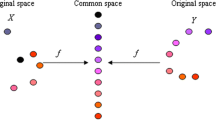Abstract
As pattern recognition methods, subspace methods have attracted much attention in the fields of face, object and video-based recognition in recent years. In subspace methods, each instance is characterized by a subspace that is spanned by a set of vectors. Thus, the distance between instances reduces to the distance between subspaces. Herein, the subspace distance designing problem is considered mathematically. Any distance designed according the method presented here can be embedded into associated recognition algorithms. The main contributions in this paper include:
– Solving the open problem proposed by Wang, Wang and Feng (2005), that is, we proved that their dissimilarity is a distance;
– Presenting a general framework of subspace construction, concretely speaking, we pointed out a view that subspace distance also could be regarded as the classical distance in vector space;
– Proposing two types of kernel subspace distances;
– Comparing some known subspace (dis)similarities mathematically.
Preview
Unable to display preview. Download preview PDF.
Similar content being viewed by others
References
Basri, R., Jacobs, D.: Lambertian reflectance and linear subspaces. IEEE Trans. Pattern Analysis and Machine Intelligence 25(2), 218–233 (2003)
Birkhoff, G., Mac Lane, S.: A Survey of Modern Algebra (Akp Classics). AK Peters Ltd., Wellesley (1997)
Etemad, K., Chellappa, R.: Discriminant analysis for recognition of human face images. Journal of Optical Society of America A 14, 1724–1733 (1997)
Golub, G.H., Ye, Q.: An inverse free preconditioned Krylov subspace method for symmetric generalized eigenvalue problems. SIAM Journal on Scientific Computing 24, 312–334 (2002)
Golub, G.H., Van Loan, C.F.: Matrix Computations, 2nd edn. The Johns Hopkins University Press, Baltimore, London (1989)
Hotelling, H.: Relations between two sets of variates. Biometrika 28(3/4), 321–377 (1936)
Martinez, A.M., Kak, A.C.: PCA versus LDA. IEEE Trans. Pattern Recognition and Machine Intelligence 23(2), 228–233 (2001)
Moghaddam, B., Pentland, A.: Probabilistic visual learning for object representation. IEEE Trans. Pattern Recognition and Machine Intelligence 19, 696–710 (1997)
Moghaddam, B.: Bayesian face recognition. Pattern Recognition 13(11), 1771–1782 (2000)
Müller, K.-R., Mika, S., Rätsch, G., Tsuda, K., Schölkopf, B.: An introduction to kernel-based learning algorithms. IEEE Trans Neural Networks 12(2), 181–202 (2001)
Oja, E.: Subspace Methods of Pattern Recognition. Research Studies Press, England (1983)
Seung, H.S., Lee, D.D.: The manifold ways of perception. Science 290, 2268–2269 (2000)
Simard, P., Le Cun, Y., Dender, J.: Efficient pattern recognition using a new transformation distance. In: Hanson, S., Cowan, J., Giles, C. (eds.) Advances in Neural Information Processing Systems, pp. 50–58. Morgan Kaufman, San Mateo (1993)
Turk, M., Pentland, A.: Eigenfaces for recognition. Journal of Cognitive Neuroscience 3, 72–86 (1991)
Wang, L., Wang, X., Feng, J.: Intrapersonal subspace analysis with application to adaptive bayesian face recognition. Pattern Recognition 38, 617–621 (2005)
Wang, L., Wang, X., Feng, J.: Subspace distance analysis with application to adaptive Bayesian algorithm for face recognition. Pattern Recognition 39(3), 456–464 (2006)
Wolf, L., Shashua, A.: Kernel principal angles for classification machines with applications to image sequence interpretation. In: Proceedings of the IEEE Conference on Computer Vision and Pattern Recognition (2003)
Wolf, L., Shashua, A.: Learning over sets using kernel principal angles. Journal of Machine Learning Research 4(6), 913–931 (2004)
Yamaguchi, O., Fukui, K., Maeda, K.: Face recognition using temporal image sequence. In: IEEE International Conference on Automatic Face & Gesture Recognition (1998)
Author information
Authors and Affiliations
Editor information
Editors and Affiliations
Rights and permissions
Copyright information
© 2006 Springer-Verlag Berlin Heidelberg
About this paper
Cite this paper
Sun, X., Cheng, Q. (2006). On Subspace Distance. In: Campilho, A., Kamel, M. (eds) Image Analysis and Recognition. ICIAR 2006. Lecture Notes in Computer Science, vol 4142. Springer, Berlin, Heidelberg. https://doi.org/10.1007/11867661_8
Download citation
DOI: https://doi.org/10.1007/11867661_8
Publisher Name: Springer, Berlin, Heidelberg
Print ISBN: 978-3-540-44894-5
Online ISBN: 978-3-540-44896-9
eBook Packages: Computer ScienceComputer Science (R0)




